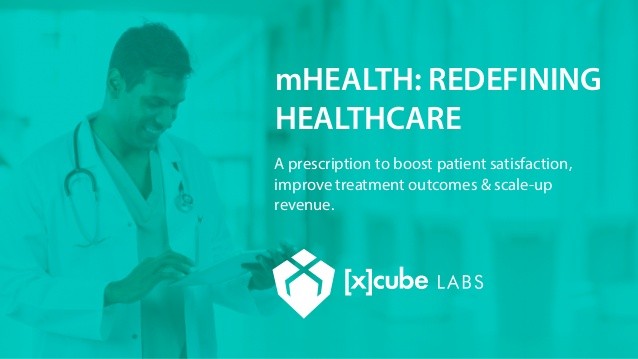mHealth apps: Mobilizing care and wellness
Mobile devices and apps are swiftly changing the face of healthcare across the globe. While consumers are increasingly using apps helpful in curing common cold to weight management to chronic diseases like Asthma and Diabetes, healthcare providers, on the other hand, are coming-up with new apps and mobile-compatible devices, motivated by its various benefits like reach to larger population, improved service quality and lower costs. As per a research2guidance survey, the market size for mHealth app market is going to double this year following a significant jump last year. Despite this substantial growth, the survey notes, mHealth market is still in an embryonic state when compared to the US$ 6 trillion global healthcare market clearly highlighting the opportunities available and reasoning the need for healthcare providers and suppliers to adopt mobility on a larger scale.
As per a research2guidance survey, the market size for mHealth app market is going to double this year following a significant jump last year. Despite this substantial growth, the survey notes, mHealth market is still in an embryonic state when compared to the US$ 6 trillion global healthcare market clearly highlighting the opportunities available and reasoning the need for healthcare providers and suppliers to adopt mobility on a larger scale.
| mHealth Benefits | |
| Patients | Healthcare providers and suppliers |
| Health information on fingertips. | Lesser costs per patient. |
| Better personal health and quality of life. | Improved quality of service and efficiency. |
| Improved service levels and reduced waiting time. | Reduced manpower requirements. |
| Lesser visits to doctor’s clinic or hospitals. | Coverage to bigger population. |
| Self monitoring and diagnosis. | Real-time information access and sharing. |
| Regular medication and adherence support. | Better monitoring of patients. |
| Freedom from multiple documents. | Optimum utilisation of resources. |
| Lesser treatment costs. | Easy access to patients. |
The numbers are encouraging…
A study commissioned by Telenor Group and the Boston Consulting Group in first quarter of 2012 revealed: 30% of smartphone users are likely to use “wellness apps” by 2015 and secondly, mobile is the most popular technology among doctors since the stethoscope. The survey further revealed- costs in elderly care can be reduced by 25% while maternal and prenatal mortality expenses can be reduced by as much as 30% through mobile solutions. As per a recent PwC Global Healthcare survey, 59% of the consumers using mHealth services reported that these services have reduced the number of visits to the doctor. The increasing enthusiasm among smartphone armed consumers for medical apps has made service providers to include apps in their delivery mechanism and provide services through it. Currently, there are around 20,000 to 25,000 apps that fall into the health & wellness category in app stores with each day adding a new app into the kitty.
| “In a survey, respondents ranked more convenient access to their health-care provider, the reduction of out-of-pocket health-care costs and having greater control over their health as the top three reasons to use mHealth.”
Source-Foxbusiness |
There’s an app for that…
From ‘BodyBugg SP’ (by 24 Hour Fitness) counting daily calories intake to monitoring blood sugar levels through ‘Glucose Tracker’, mobile apps are doing everything. On the other hand, there are physician / healthcare provider centric apps like CA MOBILE providing mobile access to EMR systems ( GE – Centricity Advanced), and ‘PATIENT TRACKER’ providing all required information on fingertips and aiding them in monitoring patients remotely. To compliment these apps, there are medical devices that can be integrated to smartphones and help read/record patient’s vitals and detect ailments.
A few popular application areas for medical apps include-
- Education & Awareness Apps- To promote health awareness among consumer through information and tips through articles, tips, videos etc., on diets, exercises, lifestyle habits, latest research results etc.
- Point of Care Support- Help patients in diagnosis of any ailment, clinical care, patient records etc.
- Patient Monitoring- Support patient adherence to appointments, medications, precautions etc.
- Emergency Medical Response- Help patients with necessary care during emergencies, accidents and disasters.
- Health Insurance- For insurers, to provide help to their customers by providing policy related information on the app and enabling claims/reimbursements etc., through it.
- Pharmacy- For drug manufacturers, to provide help to their customers in ordering medicines, reminder alerts etc.
- Physicians- Book appointments, read patient’s history, provide medication online.
Mobile apps are the future…
While mobile healthcare apps are booming in usage, both by consumers and providers, but its early days yet for the consumer healthcare industry. There is a huge potential of mobile apps in patient care much beyond what we are witnessing today. In future, we will see remote app-to-app or app-to-machine interaction and data collection through wireless sensors that will be relayed real-time to doctors for quick response. App-to-app interaction and wireless sensors is already introduced in a few areas and as the technology further evolves and benefits become more evident, we will see more advanced usage of these technologies in the coming days. According to a PWC survey, 64% of doctors believe mHealth market to be full of exciting possibilities in the days ahead. For consumers, evolution in healthcare apps means more control and better management of their health at lesser costs. In other words, mobile apps are set to occupy a dominant position across the ecosystem.
Tags: mHealth, mobile health care
![Blog-[x]cube LABS](https://d6fiz9tmzg8gn.cloudfront.net/wp-content/uploads/2016/06/blog_banner.jpg)


